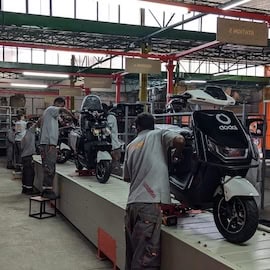The average age of a vehicle in Ethiopia is 20 years. In Kenya, the average age easily surpasses a decade, while in Rwanda, the average taxi is 24 years old. Similar numbers can be seen across East Africa, and indeed the entire continent.
The nature of Africa’s collective automobile fleet — which overwhelmingly consists of aged, high-polluting vehicles — is a major challenge for a continent that is keen to play a leading role in the world’s battle against climate change, and which aims to be on the forefront of the green technologies and industries that will define this century.
As these cars start to come to their “end of life” stage and come off the roads, Africa faces a critical choice: Will it continue to rely on the same kind of imported, high-polluting, diesel and guzzling vehicles that are currently dominant, or will it switch to much cleaner, greener, electric alternatives?
The Role of E-Mobility in Africa’s Transition to Green Transportation
Several African governments have acknowledged the role e-mobility will need to play in the continent’s transition to green transportation. Ethiopia has led the way in this — in January 2024, it became the first country anywhere in the world to ban the import of all petrol and diesel vehicles.
The country’s finance ministry has also introduced major tax incentives to encourage the uptake of electric vehicles — for example, there is a 0% import duty for EVs compared to up to 300% for fuel-powered vehicles. Partly because of such initiatives, there are already more than 100,000 electric vehicles on the road in Ethiopia, and the government aims to have at least 400,000 on the road by 2030.
Ethiopia is a market with particular potential when it comes to electric vehicles, given the country’s existing renewable energy policies and infrastructure. More than 90% of Ethiopia’s energy supply already comes from hydropower, so it has an abundance of cheap electricity. This means that the operating costs for e-bikes can be up to 95% cheaper than those of fuel-powered bikes, making the switch to electric vehicles not only environmentally sound, but economically logical for consumers and businesses.
Obstacles to EV Uptake in Ethiopia
But while countries such as Ethiopia are increasingly committed to harnessing the potential of EVs, practical issues still remain. The biggest concern is ensuring that sufficient infrastructure is in place to enable businesses and individuals to access the electricity they need to charge EVs.
Indeed, although Ethiopia has made remarkable progress in developing its hydropower capacity, limited transmission networks and other infrastructure means that this electricity reaches less than half of the population. According to the World Bank, around 77% of the Ethiopian population resides in rural areas, but rural electricity coverage stands only at about 43%, compared to almost 95% coverage in urban environments.
This poses an obvious problem for those aiming to encourage the uptake of electric vehicles — especially outside of Ethiopia’s main urban centres: How can consumers make the switch to greener alternatives if they are unable to charge them reliably?
Battery Swapping: A New Solution for the Lack of E-Mobility Infrastructure
However, new solutions are emerging that offer strong reasons for optimism that this challenge can be overcome. At my own company, Dodai, an e-mobility firm based in Addis Ababa, we are leading efforts to establish battery swapping stations across Ethiopia to solve these critical infrastructure concerns.
These stations work by allowing riders of electric bikes to exchange their depleted batteries for fully charged ones in a matter of minutes, minimising downtime and making charging infrastructure much more accessible and practical. Especially for the large percentage of potential users who do not have access to reliable energy at home or at work, this is a gamechanger in offering customers a cheap, quick and convenient way to access the fully charged batteries they need to use their e-bikes as desired.
Furthermore, this battery swap model allows e-mobility firms like Dodai to scale quickly without having to wait for individuals and business across the country to secure their own access to electricity and charging points. For this reason, we are starting by installing 100 battery swap stations in strategic locations across Addis Ababa this year. In three years, we will have installed 300 such stations, extending our efforts to include other areas of Ethiopia. E-mobility companies in other countries in the region, such as Kenya and Rwanda, have already started this process, and they have seen significantly increased uptake of green transportation options as a result.
Battery swap stations are particularly important for riders planning to use e-bikes for their jobs in the gig economy, such as in delivery or logistics. Electric vehicles hold unique promise for this group because petrol — which must typically be imported in African countries — tends to be expensive compared to domestically produced electricity. In addition, given how old the average car or fuel-powered motorbike is in Africa, users who rely on driving to make a living often have to deal with frequent breakdowns, undermining their efficiency and profitability.
Transitioning to electric alternatives can allow these riders to realise savings of 80-90% on their fuel and maintenance, according to Dodai’s estimates — meaning they can increase their earnings while reducing their environmental impact. The reliability of e-bikes and their longer lifespan mean that users who drive for a living can work longer hours without worrying about breakdowns.
This is vital not only for improving workers’ financial situations but also for enhancing the quality of their time at work and minimising their stress levels. At Dodai, we have the mantra “one bike equals one job” because we recognise the massive potential that e-mobility solutions have to create better-paid, higher-quality jobs for gig economy workers in Ethiopia and across Africa.
Leading the Way Toward Sustainable Transportation Systems in Africa
As a continent, Africa stands at a critical crossroads as it faces the challenge of transitioning to greener, more sustainable transportation systems. This challenge has global ramifications too, as the world collectively seeks to battle climate change.
Africa — despite being responsible for just a fraction of global carbon emissions — is one of the regions that are most exposed to negative climate impacts. So it has a particular incentive to encourage sustainable practices in transport and many other areas.
Ethiopia has taken bold steps to incentivise electric vehicle adoption and, in many ways, it is leading the charge toward a greener future in East Africa and beyond. The question now is whether Ethiopia and other African countries can take the measures required, such as promoting battery swapping and continuing to implement EV-friendly regulation, to scale this vital industry.
There remains work to be done, but innovative new solutions, such as battery swapping stations, are demonstrating that there is a viable path forward to scale the e-mobility industry across the continent. With the right policies, infrastructure and investment, Africa can embrace a cleaner, greener future while driving economic growth and job creation.
Yuma Sasaki is the founder and CEO of Dodai.
Photo credit: Dodai
Publisher: Source link






